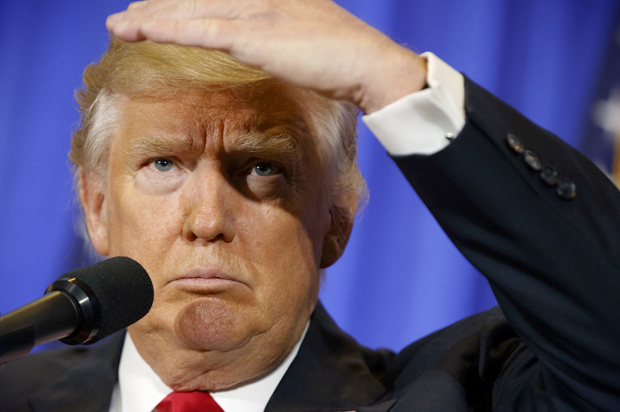If President Donald Trump’s whiplash-inducing barrage of flip-flops this week was not indication enough that he knows nothing, he just clearly admitted it. Less than 100 days into his first term, Trump finally came to the realization that running a country is a lot harder than hosting a reality TV show.
“After listening for 10 minutes, I realized it’s not so easy,” the president revealed in an interview with The Wall Street Journal. While recounting his first discussion with Chinese President Xi Jinping, Trump admitted that the relationship between China and North Korea may be more complicated than he thought.
On the campaign trail, Trump routinely pledged to force China to handle the threat of a nuclear-powered North Korea. After he reversed course on labeling China as a currency manipulator early on Wednesday, Trump told the newspaper that speaking with his Chinese counterpart taught him things are “not what you would think.”
“[President Xi Jinping] then went into the history of China and Korea. . . . And Korea actually used to be a part of China. And after listening for 10 minutes I realized that it’s not so easy. You know I felt pretty strongly that they have a tremendous power over China. . . . But it’s not what you would think.”
“You cannot allow a country like that to have . . . nuclear weapons,” Trump also told the Journal.
Such an admission raises the same question proposed by The Washington Post’s Dana Milbank: Is the president “discovering for himself things the rest of us already knew?” In the frenetic world of Trump, his administration often appears to have just discovered the complexities of governing.
For example, Trump infamously declared, “Nobody knew that health care could be so complicated.” Maybe he missed all news of the decadelong debate on the issue when scrolling through his Twitter feed. The president also told The Washington Post that he didn’t realize how different dealmaking in business is from doing so in government.
Trump also explained his sudden reversal on the Export-Import Bank this week, which furthers highlights how easily his mind changes.
“I was very much opposed to Ex-Im Bank, [but] it turns out that, first of all, lots of small companies will really be helped. So instinctively you would say it’s a ridiculous thing but actually it’s a very good thing and it actually makes money. You know, it actually could make a lot of money.”
Another one of this many U-turns came earlier this week regarding NATO. Trump reassured the peacekeeping organization that he no longer believes it is “obsolete” and will work with the alliance to combat global terrorism.
The events of the last few days appear to have completely reshaped the assumptions Trump brought into office with him about improving relations with his favorite nation (apart from the United States, of course): Russia. In August Trump had told supporters: “There is nothing I can think of that I would rather do than have Russia friendly.” At a campaign rally in October, Trump said, “if we got along with Russia and Russia went out with us and knocked the hell out of ISIS, that is OK with me.”
But after his recent decision to launch missiles against an ally of Russia, the regime of Syrian President Bashar Assad, Trump said U.S.-Russia relations have reached their lowest point since the Cold War.
The United States is “not getting along with Russia at all,” Trump said.
The chemical weapons attack Syria has quickly tested Trump’s inexperienced White House.
After spending months on the campaign trail castigating his predecessors for getting sucked into a Middle East quagmire, and even attempting to close the door to refugees from Syria, Trump seemingly had a heartfelt response to images of gassed Syrian children. He used the chemical attack to justify taking military action.
“I like to think of myself as a very flexible person. I don’t have to have one specific way, and if the world changes, I go the same way. I don’t change. Well, I do change. And I am flexible. And I’m proud of that flexibility. And I will tell you that attack on children yesterday had a big impact on me, big impact. That was a horrible, horrible thing.”
The past week has seen a flurry of gaffes, walk backs and conflicting statements. But Trump’s stunning series of turnarounds on major campaign talking points recently (at least six, by my count) displays that the 70-year-old president is learning — even if it isn’t the right lessons.

